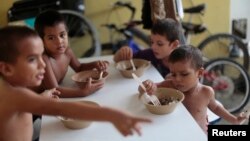Food shortages and cuts in farming jobs caused by a prolonged drought
are driving thousands of people living in parts of Central America to leave their homes, according to new academic research.
The International Organization of Migration (IOM) and the United Nations World Food Program (WFP) said in a study that worsening hunger, combined with high levels of crime and gang violence, are driving poor families in El Salvador, Guatemala and Honduras to migrate.
Those affected are moving within their own country, often from rural to urban areas in search of a better life and jobs, or to other countries in the region or the United States, the study said.
"Migration has always been linked to income disparities between countries, socio-economic instability, and population pressures; however, this is the first time food insecurity has been specifically singled out as a trigger for migration," Miguel Barreto, WFP's regional director for Latin America and the Caribbean, said in a statement on Thursday.
"This exploratory study is important because it underscores the need to invest in food security to prevent migration."
Hardest hit are subsistence farmers in Central America's "dry corridor" running through parts of Guatemala, El Salvador and Honduras, where growing numbers of women and children have migrated in recent years, the study said.
Low rainfall for two consecutive years has caused widespread and severe drought, leading to poor harvests of staple crops like beans and maize and leaving more than one million people in the corridor facing a shortage of food and rising food prices, the study said.
"This has negatively affected many of the most vulnerable segments of society that are largely dependent on one harvest per year and compounded by declining labor opportunities," the study, supported by the Organization of American States, said.
Last year 'a significant percentage of households' affected by the drought reported at least one family member migrating in search of a job, according to a WFP study.
The Central American Agricultural Council — headed by agriculture ministers of the subregion — declared a state of alert after hundreds of thousands of subsistence farmers lost part or all their crops planted for the main May-September season, the U.N. Food and Agriculture Organization said earlier this week.
Food harvests in Central America have fallen this year by as much as 60 percent for maize and 80 percent for beans due to prolonged dry spells linked to the El Nino weather phenomenon, according to the FAO.
Rampant gang violence is also forcing people to leave their homes, especially in Guatemala and Honduras, and is linked with the shortage of food, the study said.
"A relationship exists, especially between food security and migration, and migration and violence, and to a lesser degree also between food security and violence," the study said.
It said more research was needed to better understand the correlation between violence, hunger and migration and the current evidence 'is not conclusive'.
The El Nino weather pattern could last until early 2016, the study said.





